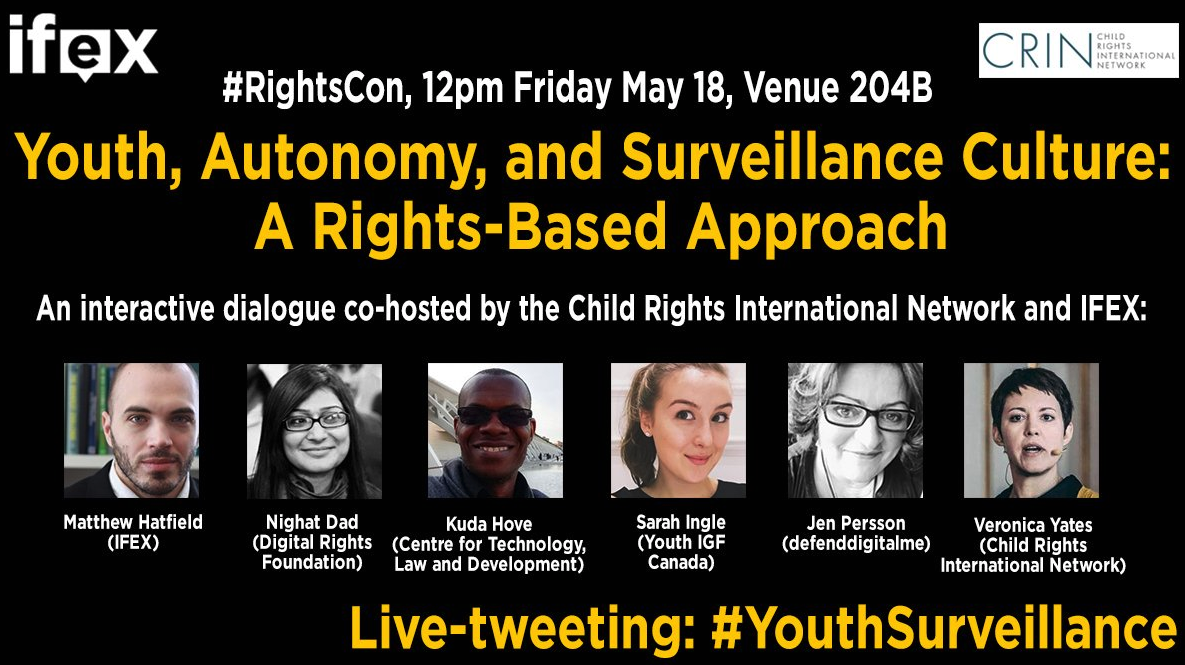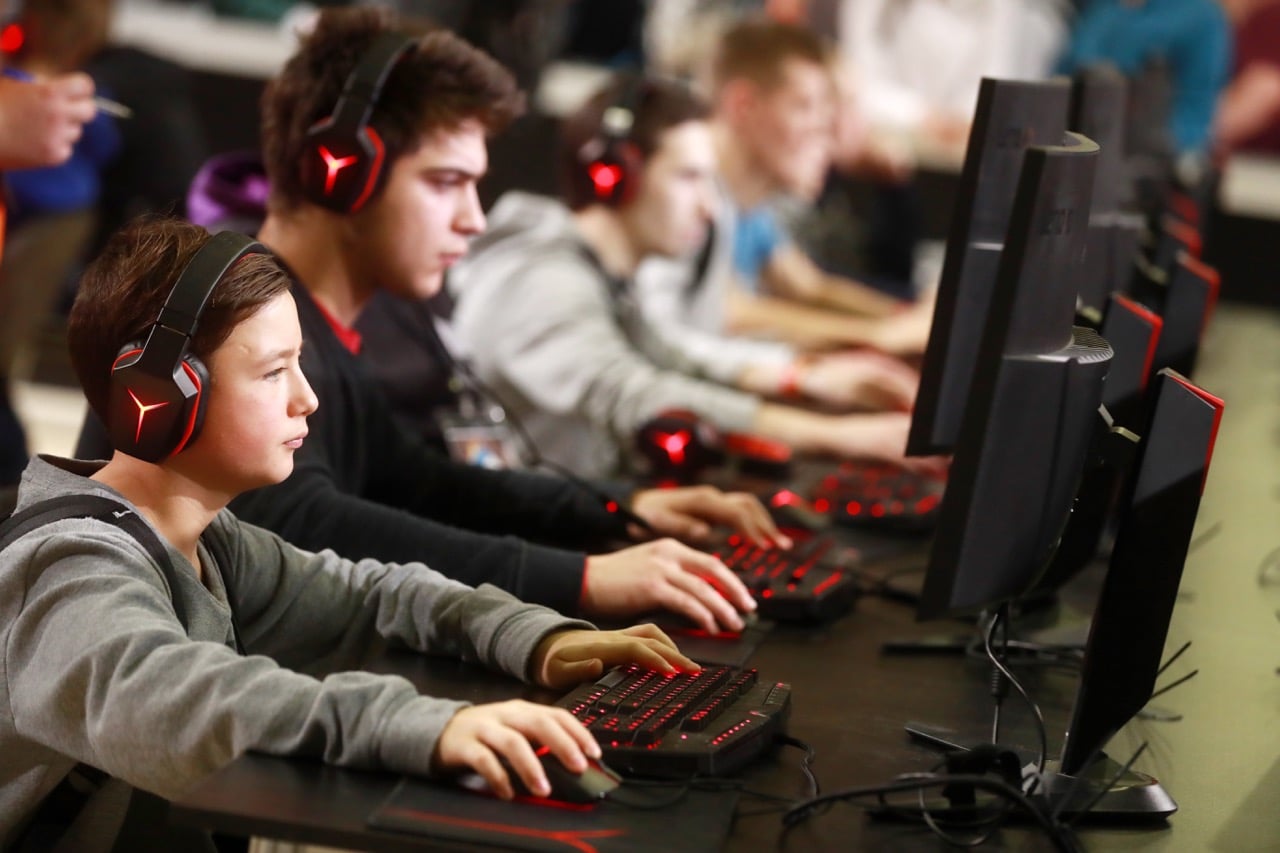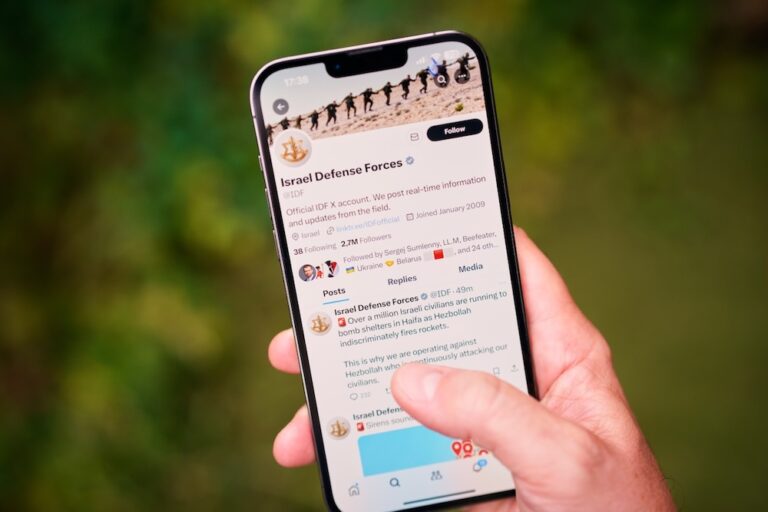While the internet creates new possibilities for children to express themselves, pervasive monitoring deeply undermines the value of these opportunities. IFEX co-hosted a session with Child Rights International Network at this years's RightsCon to consider the human rights of children in the digital age.
When you think of surveillance, what first comes to mind? For many it conjures up images of shadowy spy agencies, Edward Snowden or the vast databases of personal information held by powerful companies like Facebook. When we think of highly surveilled populations, we tend to think of China’s ever-expanding surveillance state, or of countries like Turkey and Bahrain which arrest and imprison their own citizens for what they say online.
However, there is one group of people that may not spring immediately to mind, but that constitutes one of the most closely surveilled populations on the planet: children and youth. Young people today are the first generation that has been tracked since birth. Their information has been recorded, shared and sold since their first days, making their right to privacy more of a polite fiction than a lived experience.
The pervasiveness of this surveillance threatens to shape young people’s understanding of their ability to express themselves freely and participate in civil society. If the decision-makers of tomorrow grow up in a climate where they feel obliged to self-censor, what impact will that have on the world they’ll be shaping?
In July 2017 IFEX published an interview with Veronica Yates, the Director of the Child Rights International Network (CRIN) – a global research, policy and advocacy organisation working for a world where children’s rights are recognised, respected and enforced. We decided to help raise awareness of this issue further, in partnership with CRIN, by co-hosting an event at RightsCon, the world’s leading conference on human rights in the digital age. This year’s RightsCon took place in Toronto, from 16-18 May.
Entitled Youth, Autonomy and Surveillance Culture: A Rights-Based Approach, our session featured the following speakers:
● Our co-host Veronica Yates, from CRIN;
● Jen Persson, from defenddigitalme, a UK campaign for schoolchildren’s privacy;
● Kuda Hove, from the Centre for Tech Law and Development, a research institution in Zimbabwe focusing on law and information communication technology;
● Nighat Dad, from the Digital Rights Foundation, a women-led advocacy organisation in Pakistan focusing on ICTs to support human rights, democracy & digital governance;
● Sarah Ingle, from the Youth Internet Governance Forum, which creates opportunities for Canadian youth to engage with issues of internet governance.
IFEX’s campaigns and advocacy coordinator Matt Hatfield moderated the session, which was also live-tweeted to a global audience at #YouthSurveillance. Matt started by inviting each of our guest speakers to help frame the dialogue.
Veronica Yates kicked things off with a simple yet powerful point: “Children are human beings today, with human rights today. These are the rights we want to talk about today.” Veronica also emphasised that, unlike adults, children often don’t have the ability to safeguard themselves from surveillance – they are the most surveilled people on the planet, but the least empowered to do anything about it.
Jen Persson spoke next, and argued that what we often see is over-surveillance of children in the name of protection. Although protection is obviously important, at present it’s trumping every other consideration. She warned that if children’s human rights are not put first in a world that is increasingly about machine-learning and machine-driven decisions, we will find that those human rights are left behind.
Jen also highlighted how surveillance conducted by schools potentially leaves children with a worrying track record that would follow them throughout their lives, citing as an example children flagged as potential gang members due to surveillance software responding to innocent searches for the phrase “black rhino” – which also happens to be the name of an FBI operation against gangs of drug smugglers in Denver.
After Jen mentioned the collection of biometric data from children in the UK, Nighat Dad raised a laugh when she expressed relief that Pakistan does not yet conduct this level of technological surveillance in schools. However, she warned that the country does have a deeply entrenched level of social surveillance, especially targeted at young women and girls.
#YouthSurveillance is not just a by-product of northern takes on privacy. @nighatdad links the topic to social surveillance in Pakistan – which gender-based violence are too familiar with. #RightsCon
— Mariel García-Montes (@faeriedevilish) May 18, 2018
Nighat also observed that Pakistan’s child protection laws are outdated and do not address the digital age.
Kuda Hove said that in Zimbabwe the issue of access is high on the radar, noting that on average a Zimbabwean child does have access to the internet, whether via their own or often a family device.
He also warned that Zimbabwe’s government has taken a number of steps that undermine privacy, even to the extent of tracking children’s internet activities. For example, the country’s cybercrime legislation gives government the power to install keystroke loggers and other trackers on targets’ devices. If that target has children, they too will be affected due to how common device-sharing is among Zimbabwean families.
Sarah Ingle spoke about the normalization of surveillance in children’s educational experiences, and how both the education system and private companies are complicit in this. Observing that her generation is “used to being quantified”, she said that she and her friends play a game on Instagram where they drop random words into their conversation, and then see if those topics pop up in their ads in a week or so.
After these opening remarks, the event was thrown open to our large and lively audience. A number of key themes came up repeatedly in the ensuing discussion:
The rise of government and private child surveillance databases:
One audience member flagged concerns about the forms of surveillance used to create radicalization databases in the UK and gang databases in the US.
Jen Persson highlighted that there’s very little oversight of the ethical or privacy values of businesses pushing surveillance software, citing the example of some that list dozens of affiliates with whom they share children’s data.
The rise of parental surveillance apps:
Underlining the importance of parental responsibility, one participant noted that if you look on parenting blogs or Pinterest, you’re unlikely to find toolkits on how to protect your kids from surveillance. Instead you’re far more likely to find instructions on how to key-log them.
These concerns were echoed by others, who also mentioned the negative role played by governments. In South Korea, for example, the government funded a ‘Smart Sheriff’ app which was required to be installed on all devices owned by children and young people. Alongside a built-in keystroke logger, the app also tracked users’ locations, app usage, and even the websites they visit. The Korean government was ultimately forced to withdraw the app after an investigation by technical experts at Citizen Lab found multiple vulnerabilities that left children’s private lives exposed to hackers.
The role played by parents more generally:
Many contributors brought up the role of parents in facilitating child surveillance, with one asking “How can we ensure responsible parenting, because I don’t believe surveilling your child constitutes responsible parenting.” Another audience member pointed out that many parents act recklessly in terms of how they share information about their kids, whether over social media or at parent-teacher meetings.
The need to ensure children and parents are informed of privacy risks:
One contributor asked what we can do to ensure that app developers take some responsibility to inform children and parents about the privacy implications of their apps. She pointed out that in Latin America social media apps achieve huge popularity among children unaware of how their data is being used, and suggested that the apps themselves should be designed in ways that raise awareness. This point was echoed by another speaker who said there’s little point in simply making more toolkits that just end up in a toolkit graveyard; awareness-raising is most effective at the moment people are interacting with the app.
Sarah Ingle agreed, and argued that children and their parents would benefit from an effective educational tool that could be used in work and home settings to help them navigate a digital world that’s becoming increasingly complex. There was general agreement among participants that clearer information is a must-have.
As can be seen from the above, and from the positive response we received online, the event not only sparked a fascinating discussion, it highlighted a number of key challenges.
There was broad consensus that we need concrete action from corporations, governments, and multinational institutions to safeguard young people from surveillance, to protect their personal data, and to ensure they can express themselves freely. There is also a clear need to support parents so they can make more informed decisions when it comes to their children’s privacy, specifically when it comes to the use of parental surveillance apps.
Note: room is packed and audience bubbling up with strong opinions. We need more spaces to talk youth and tech in non-youth convs! Big shoutout to @crinwire @ifex, @nighatdad @theabb, for an insightful and challenging conversation on #youthsurveillance [end of thread]
— Mariel García-Montes (@faeriedevilish) May 18, 2018
At IFEX, we’re very grateful to our co-hosts at the Child Rights International Network, to all our guest speakers, and to everyone who joined the discussion in person and online. We’re determined to continue drawing attention to this issue, in partnership with our members, other civil society organisations, and individuals.
As ever, you can keep in touch by following us on Twitter and by subscribing to our weekly newsletter. You can also use Twitter to keep in touch with the Child Rights International Network, the Digital Rights Foundation, defenddigitalme, the Centre for Tech Law & Development, and Youth IGF Canada.




